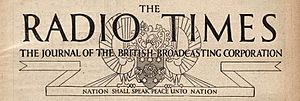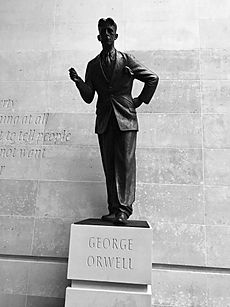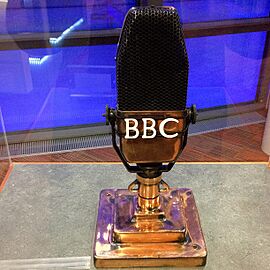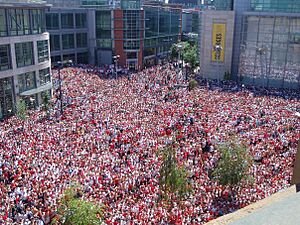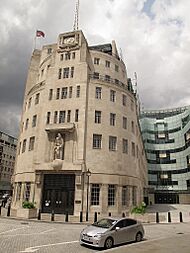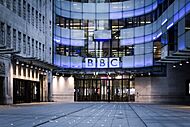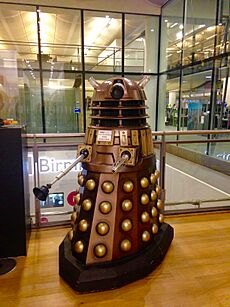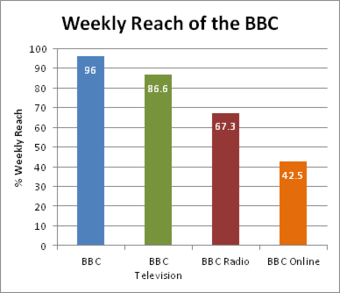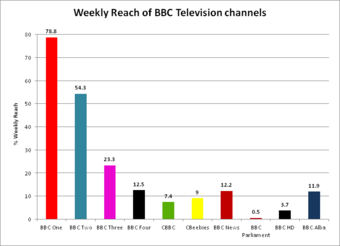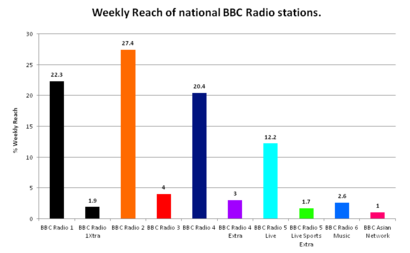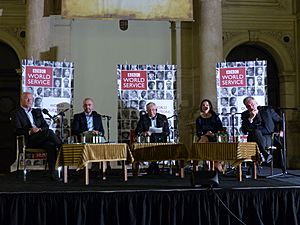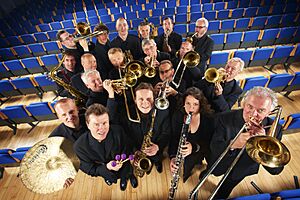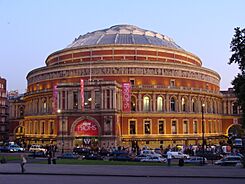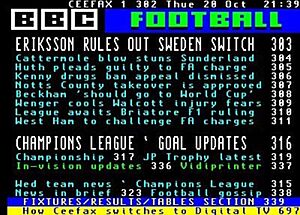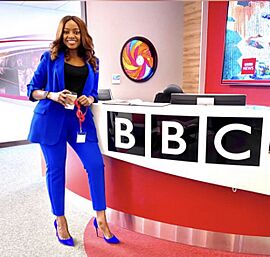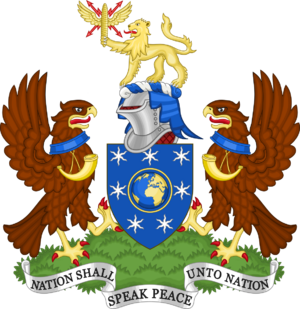BBC facts for kids

Logo used since 2021
|
|
| Chartered corporation, public broadcaster | |
| Industry | Mass media |
| Predecessor | British Broadcasting Company |
| Founded | 18 October 1922 (as British Broadcasting Company) 1 January 1927 (as British Broadcasting Corporation) |
| Founder | Government of the United Kingdom |
| Headquarters | Broadcasting House London, England |
|
Area served
|
Worldwide |
|
Key people
|
|
| Products |
|
| Services |
|
| Revenue | |
|
Operating income
|
|
| Total assets | |
|
Number of employees
|
|
| Divisions |
|
The British Broadcasting Corporation (BBC) is a big public broadcasting company in the UK. Its main office is in London, England. It started in 1922 as the British Broadcasting Company. Then, on January 1, 1927, it became the British Broadcasting Corporation. The BBC is one of the oldest and largest broadcasters in the world. It has over 21,000 employees.
The BBC was created under a special rule called a royal charter. It works with the UK government. Most of its money comes from a yearly TV licence fee. This fee is paid by households and businesses in Britain that watch live TV or use the BBC's streaming service, iPlayer. The British government sets this fee. It helps pay for the BBC's radio, TV, and online services across the UK. Since 2014, it also funds the BBC World Service. This service broadcasts in many languages around the world.
Some of the BBC's money also comes from BBC Studios. This is a part of the BBC that sells BBC shows and services to other countries. It also helps distribute the BBC's international news channels. The BBC is sometimes called the Beeb or Auntie. In 1923, it launched Radio Times, a magazine that listed radio shows. A Christmas edition of Radio Times in 1988 sold 11 million copies. This made it the best-selling British magazine issue ever.
Contents
History of the BBC
How British Broadcasting Began (1920–1922)
Britain's first public radio broadcast happened in June 1920. It was from a factory in Chelmsford. A famous singer, Dame Nellie Melba, performed. People loved it, but officials worried it would mess with military messages. So, these broadcasts were stopped by late 1920.
By 1922, many people wanted radio licences. The government decided to allow broadcasting again. To avoid chaos like in the United States, they gave one licence to a group of radio makers. This group formed the British Broadcasting Company Ltd on October 18, 1922. John Reith became its first general manager. The company was supposed to get money from selling BBC radio sets. The BBC still tries to follow Reith's idea to "inform, educate, and entertain."
Becoming a Public Service (1923–1926)
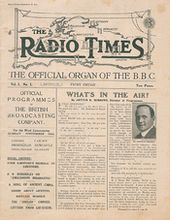
The way the BBC got money did not work well at first. Not enough radio sets were sold. So, the government looked into how broadcasting should be funded. They decided on a simple licence fee to pay for broadcasts. The BBC was the only company allowed to broadcast. Also, to avoid competing with newspapers, the BBC could not broadcast news before 7 PM. All news had to come from other news services. In September 1923, Reith launched Radio Times. It was the first magazine to list radio and TV shows. The first issue sold a quarter of a million copies.
By 1925, people were still thinking about the future of broadcasting. The BBC wanted to be seen as a public service, not a business. In May 1926, a big workers' strike happened in the UK. Newspapers stopped printing. The BBC became the main source of news. This was a tricky time for the BBC. John Reith wanted to be fair, but also knew the government could take over the BBC. The BBC tried to be balanced in its reporting. This helped the BBC gain trust from the public. After the strike, the government agreed to change the British Broadcasting Company into a non-profit, public organization. This became the British Broadcasting Corporation.
The BBC Grows (1927–1939)
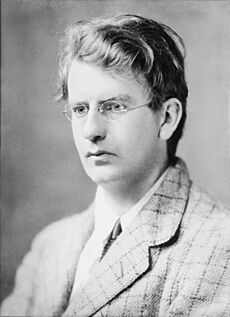
The British Broadcasting Corporation officially started on January 1, 1927. John Reith became its first Director General. The BBC chose a motto: "Nation shall speak peace unto Nation." This showed its goal to share knowledge and entertainment.
Reith believed the BBC should broadcast "all that is best." He wanted to make sure programs were of high quality and had good morals. The BBC did not have advertisements. All its money came from the licence fee. The BBC focused on serving the whole country, not just local areas. It was careful about what it broadcast. For example, until 1928, entertainers had to avoid certain topics like politics or references to drinking. The BBC also promoted British music.
In 1932, the BBC started experimental television broadcasts. These used a system invented by John Logie Baird. Regular broadcasts began in 1932. A bigger service, called the BBC Television Service, started in November 1936 from Alexandra Palace. This service used a new electronic system. This electronic system was the first of its kind in the world to be used for regular TV broadcasting.
BBC and Other Media
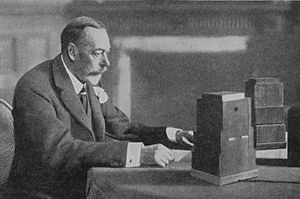
The BBC's success caused some issues with other entertainment industries. Theatres and music companies worried that broadcasting would hurt their business. For example, comedians' agents feared that radio broadcasts would make their jokes less funny for live shows. However, the BBC worked with recording companies. Radio plays were very popular. The BBC received thousands of scripts, but most were not right for radio. Music broadcasts were also very popular in the 1930s.
Second World War (1939–1945)
Television broadcasting stopped during World War II, from 1939 to 1946. BBC Radio helped keep people's spirits up. Most radio operations moved out of London to safer places like Bedford. Famous people like George Orwell worked for the BBC during the war.
During the war, Prime Minister Winston Churchill gave many important speeches on BBC Radio. On June 18, 1940, French general Charles de Gaulle broadcast a speech from London. He urged the French people not to give up to the Nazis. In October 1940, Princesses Elizabeth and Margaret made their first radio broadcast. They spoke on the BBC's Children's Hour to other children who had been moved away from cities for safety.
The BBC used its new shortwave radio technology to broadcast worldwide during the war. This helped share news and information. However, the BBC also censored some news. For example, they avoided topics that might upset relations with the Soviet Union. Music by composers from enemy countries was also not played. People with certain political ideas were not allowed to broadcast.
Later 20th Century
After the war, BBC television started again on June 7, 1946. A common myth says the announcer said, "As I was saying before we were so rudely interrupted..." But the first person on screen was Jasmine Bligh. She said, "Good afternoon, everybody. How are you? Do you remember me, Jasmine Bligh...?"
In 1955, the BBC got its first TV competitor, Independent Television (ITV). But the BBC still had a monopoly on radio until 1973. In 1964, the BBC launched a second TV channel, BBC2. The original channel became BBC1. BBC2 was the first channel to broadcast in a higher quality 625-line standard. It also started broadcasting in colour in 1967. BBC1 and ITV followed in 1969.
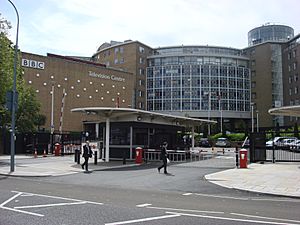
In 1964, pirate radio stations started broadcasting. This led the government to allow more radio services. The BBC then changed its radio channels. On September 30, 1967, the Light Programme split into Radio 1 (for popular music) and Radio 2 (for easy listening). The Third Programme became Radio 3 (for classical music). The Home Service became Radio 4 (for news and spoken programs). The BBC also started local radio stations in 1967.
In 1974, the BBC launched Ceefax, a teletext service. It provided news and information. In the 1980s, the BBC faced more competition from other TV and radio companies. The BBC started to sell off some parts of its business. For example, BBC Enterprises became BBC Worldwide in 1995. This company sells BBC shows and products around the world.
The BBC also launched new channels in the 1990s. These included BBC Radio 5 Live (for news and sport), BBC News 24 (a 24-hour news channel), and BBC Choice (a general entertainment channel).
The 2000s and 2010s
Channel and Branding Changes
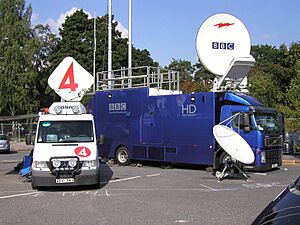
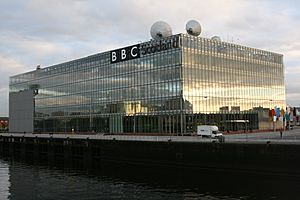
In 2002, the BBC changed some of its TV and radio channels. BBC Knowledge became BBC Four, focusing on arts and documentaries. Children's BBC split into CBBC and CBeebies for younger children. Both got their own digital TV channels. New digital radio stations were also created: 1Xtra, 6 Music, and Radio 4 Extra.
Over the next few years, other channels changed. BBC Choice became BBC Three in 2003, aimed at younger adults. BBC News 24 became the BBC News Channel in 2008. In 2008, a new Scottish Gaelic channel, BBC Alba, was launched.
BBC HD launched in 2006, showing programs in high definition. In 2010, BBC One HD also launched. BBC HD closed in 2013 and was replaced by BBC Two HD.
Selling Parts of the BBC
During this time, the BBC sold off some of its business parts to private companies. For example, BBC Broadcast was sold in 2005 and became Red Bee Media. The BBC's IT and technology services were sold to Siemens IT Solutions and Services (now part of Atos). Other sales included BBC Books and BBC Magazines.
Changes and Challenges
In 2010, the government decided to freeze the TV licence fee. This meant the BBC's main source of money would not increase. The BBC also had to take on the full cost of running the BBC World Service.
More cuts were announced in 2011. The BBC aimed to reduce its budget by 20%. This included cutting staff and moving some departments to MediaCityUK in Salford. BBC Three moved to being an online-only service in 2016. Many BBC buildings were sold, including Television Centre.
Under a new royal charter in 2017, the BBC must publish a yearly report. It plans to "re-invent" its content to compete with streaming services like Netflix. This includes making content more diverse and investing more in children's digital content.
In 2019, the BBC launched the Trusted News Initiative. This works with news and social media companies to fight against false information. In 2020, the BBC announced more cuts to BBC News. It plans to focus more on digital broadcasting to reach younger audiences.
In 2023, the BBC faced a political issue with football pundit Gary Lineker. He criticized the government's asylum policy on social media. He was suspended but then brought back after many colleagues supported him. The BBC chairman, Richard Sharp, resigned in April 2023. This was after a report found he did not share possible conflicts of interest related to a loan for Prime Minister Boris Johnson. Samir Shah became the new chairman in March 2024.
In October 2024, the BBC and Sky Sports signed a deal to broadcast the 2025–26 season of the Women's Super League.
How the BBC is Run
The BBC is a special company that is independent from the government. Its work is overseen by the BBC Board and regulated by Ofcom. The current chairman is Samir Shah.
BBC Charter and Agreement
The BBC works under a royal charter. This charter is like a rulebook for the BBC. It explains the BBC's goals and public purposes. It says the BBC should serve the public. It also says the BBC should not have advertisements on its UK services. The charter also explains how the BBC is governed. The current charter started on January 1, 2017, and will last until December 31, 2027.
BBC Board
The BBC Board started in April 2017. It replaced the old governing body, the BBC Trust. The board decides the BBC's overall plan. It checks how well the BBC's executive team is doing. It also chooses the Director-General. Samir Shah has been the chairman since March 4, 2024.
Executive Committee
The executive committee manages the BBC's daily operations. It is made up of senior managers. They meet once a month. This committee is led by the Director-General, who is currently Tim Davie. He is also the chief executive and editor-in-chief.
| Name | Position |
|---|---|
| Tim Davie | Director-general (chair) |
| Kerris Bright | Chief Customer Officer |
| Alan Dickson | Chief Financial Officer |
| Tom Fussell | CEO, BBC Studios |
| Leigh Tavaziva | Chief Operating Officer |
| Charlotte Moore | Chief Content Officer |
| Uzair Qadeer | Chief People Officer |
| Alice Macandrew | Group Corporate Affairs Director |
| Rhodri Talfan Davies | Director, Nations |
| Gautam Rangarajan | Group Director of Strategy and Performance |
| Deborah Turness | CEO, BBC News and Current Affairs |
BBC Divisions
The BBC has different teams that handle its programs and operations:
- Content: This team, led by Charlotte Moore, is in charge of the BBC's TV channels. They decide which programs to make.
- Nations and Regions: This team, led by Rhodri Talfan Davies, is responsible for the BBC's work in Scotland, Northern Ireland, Wales, and the English Regions.
Commercial Parts of the BBC
The BBC also has commercial parts that make money:
- BBC Studios: This part used to make TV shows. After joining with BBC Worldwide in 2018, it now also runs international channels. It sells programs and products in the UK and other countries. The money it makes goes back to BBC programs.
- BBC News: This team handles the international news channel. It works closely with the main BBC News team.
- BBC Studioworks: This part owns and runs some of the BBC's studios. It rents them out to BBC shows and other companies.
MI5 Vetting Policy
From the 1930s to the 1990s, MI5, the UK's spy agency, checked people applying for BBC jobs. This was to keep out anyone they thought might cause trouble. The BBC kept this secret. In 1985, a newspaper revealed this policy. The BBC then said it would stop this checking process, except for a few top jobs.
BBC Money and Buildings
The BBC has one of the largest budgets of any UK broadcaster.
How the BBC Gets Money
The main way the BBC gets money is through the television licence fee. This fee costs £169.50 per year per household since April 2024. You need this licence to legally watch live TV in the UK. The government sets the cost of the licence. If you don't pay, it's a criminal offense. There are discounts for blind people. The licence is free for households with someone aged 75 or over who also receives pension credit.
The BBC uses a company called "TV Licensing" to collect the fees. This money goes to the government, and then Parliament approves how it's given to the BBC. In 2018/19, about 216,900 people were caught watching TV without a licence.
The BBC also makes money from selling its programs and products overseas. BBC Worldwide (now part of BBC Studios) contributed about £243 million to the BBC's public services.
Some people criticize the licence fee. They say it's not fair in today's world with many streaming services. They also criticize the BBC's methods for collecting the fee. In 2023, about half a million UK households cancelled their TV licence. This was due to changing viewing habits and money worries.
The BBC's commercial part, BBC Studios, sells programs abroad. It also uses popular shows like Doctor Who and Top Gear to create merchandise.
BBC Buildings
Broadcasting House in central London is the BBC's official headquarters. It is home to most of the BBC's national and international radio stations. It is also the home of BBC News. The building was renovated and completed in 2012.
Until 2013, BBC Television was based at Television Centre in west London. This building opened in 1960 and was famous for many shows. The BBC News team moved from Television Centre to Broadcasting House in 2013. This brought many of the BBC's London operations together.
The BBC is also making more programs outside London. Major departments like BBC Sport and BBC Children's moved to MediaCityUK in Salford. This is now the biggest BBC location outside London.
Other important BBC production centres are in the UK. Cardiff is home to BBC Cymru Wales. It specializes in drama, like Doctor Who and Casualty. Broadcasting House Belfast is home to BBC Northern Ireland. BBC Scotland is based in Pacific Quay, Glasgow. It produces many network programs. The BBC Studios Natural History Unit in Bristol is famous for its wildlife documentaries.
The BBC also has many smaller local studios across the UK. These run regional TV services and BBC Local Radio stations. The BBC also has news offices around the world.
BBC Services
Television Channels
The BBC runs several TV channels in the UK and internationally. BBC One and BBC Two are the main channels. Others include BBC Three (for young adults), BBC Four (for culture and documentaries), BBC News Channel, BBC Parliament, and two children's channels, CBBC and CBeebies. All analogue TV broadcasts in the UK stopped in 2012.
BBC One has regional versions that show local news and programs. These are more noticeable in Northern Ireland, Scotland, and Wales. In 2019, a new BBC Scotland channel launched.
A new Scottish Gaelic TV channel, BBC Alba, launched in September 2008. It is the first channel to come entirely from Scotland. The BBC also has HD versions of most of its channels. BBC One HD launched in 2010.
In some other countries like Ireland, Belgium, and Switzerland, BBC channels are available through digital and cable TV. The BBC also provides its TV programs to the British Forces Broadcasting Service (BFBS). This allows UK military members serving abroad to watch BBC shows.
Since 2008, all BBC channels can be watched online through the BBC iPlayer service. This allows people to stream live TV and watch programs for seven days after they are broadcast. In 2014, BBC Three became an internet-only channel.
BBC Genome Project
In 2012, the BBC finished scanning all its program listings from Radio Times magazines from 1923 to 2009. This project is called "BBC Genome." It created an online database of BBC programs. It lists about five million programs and 8.5 million people who worked on them. The public can access this project online since October 2014.
Radio Stations
The BBC has ten radio stations for the whole UK. It also has seven stations in Wales, Scotland, and Northern Ireland, and 39 local stations in England. Five of the national stations are major ones. They are available on FM or AM radio, as well as online. These are:
- BBC Radio 1: Plays new and popular music.
- BBC Radio 2: Plays adult contemporary, country, and soul music.
- BBC Radio 3: Plays classical and jazz music.
- BBC Radio 4: Focuses on news, factual programs, drama, and comedy.
- BBC Radio 5 Live: Broadcasts 24-hour news, sport, and talk shows.
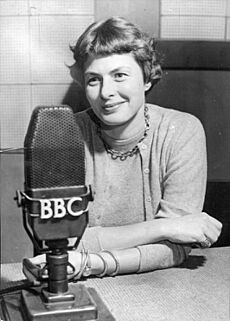
The BBC also has five digital-only radio stations. These stations add to the main five:
- BBC Radio 1Xtra: Plays new black music and urban tracks.
- BBC Radio 5 Sports Extra: Offers extra sports analysis.
- BBC Radio 6 Music: Plays alternative music and new artists.
- BBC Radio 4 Extra: Provides old drama, comedy, and children's programs.
- BBC Asian Network: Provides music, talk, and news for the Asian community.
Besides national stations, the BBC has 40 BBC Local Radio stations in England. These cover specific cities or regions. There are also six stations in Wales, Scotland, and Northern Ireland. These include BBC Radio Wales (in English) and BBC Radio Cymru (in Welsh).
For a worldwide audience, the BBC World Service provides news and information in over 40 languages. It is available in over 150 capital cities. It is the world's largest international broadcaster. It broadcasts on shortwave radio, digital radio, and online. It has an estimated weekly audience of 192 million people. Since 2011, it has been funded by the UK TV licence fee.
Historically, the BBC was the only legal radio broadcaster in the UK until 1967. Today, BBC radio stations are still among the most listened-to in the country. Radio 2 has the largest audience.
BBC News
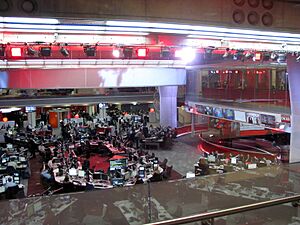
BBC News is the biggest news-gathering operation in the world. It provides news for BBC radio and TV channels. News stories are also available on the BBC Red Button service and BBC News Online. The BBC has also developed ways to get news on mobile phones and through email alerts.
When big events happen, like the 7 July 2005 London bombings or royal events, many people in the UK turn to the BBC for news. On July 7, 2005, the BBC Online website had a record number of visitors. It received about 1 billion total hits that day.
BBC Online
The BBC's online presence includes a big news website and an archive. The BBC's first online service started in 1994. The website is funded by the TV licence fee. Outside the UK, it shows advertisements. The BBC says its website is "Europe's most popular content-based site." Over 13 million people in the UK visit the site every day.
The website's homepage can be customized by users. It has links to other parts of the site, like BBC News Online, Sport, Weather, TV, and Radio. Every BBC TV or radio program has its own page on the website.
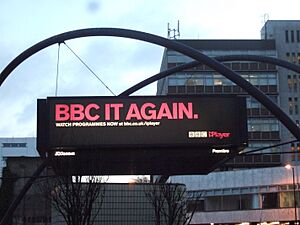
Another big part of the site is BBC iPlayer. This platform allows users to watch and listen to most TV and radio programs live. They can also watch them for seven days after they are broadcast. The BBC also offers learning services online, like BBC WebWise, which teaches people how to use the internet.
Some online companies and politicians have complained that BBC Online gets too much money from the TV licence. They say this makes it hard for other websites to compete. The BBC has responded by changing how it provides online services. It now tries to fill gaps in the market and guide users to other websites for existing information. The BBC has also closed some of its websites to save money.
In 2010, the BBC announced it would cut its website spending by 25%. This was part of a plan to make the BBC "smaller, fitter" for the digital age.
Interactive Television
BBC Red Button is the name for the BBC's interactive television services. It is available on digital TV platforms like Freeview and Sky UK. Unlike the old Ceefax, BBC Red Button can show full-colour graphics, photos, and videos. It provides news, weather, and sport 24 hours a day. It also offers extra features related to programs. For example, viewers can play along with game shows or vote on issues. During big sporting events, less mainstream games are often shown on the Red Button.
Music and Arts
The BBC has five staff orchestras and a professional choir. These include the BBC Symphony Orchestra in London and the BBC Scottish Symphony Orchestra in Glasgow. It also supports two amateur choirs.
The BBC Proms is a popular summer classical music festival. The BBC has produced it every year since 1927. The BBC's orchestras and choirs perform many of the concerts. Many famous musicians have played at the BBC, including The Beatles. The BBC also broadcasts the Glastonbury Festival and covers the Eurovision Song Contest.
Other BBC Ventures
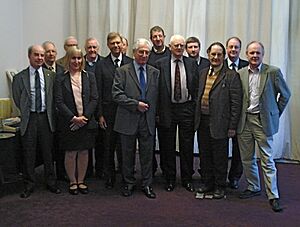
The BBC also has other projects. It shows programs on BBC Big Screens in city centres. The BBC and the UK government also run BBC Monitoring. This service watches radio, TV, newspapers, and the internet worldwide. In the 1980s, the BBC developed several computers, like the BBC Micro. This was part of a project to teach people about computers.
Ceefax
The BBC had the world's first teletext service called Ceefax. It ran from 1974 until 2012. It showed information pages like news, sport, and weather. Millions of people used Ceefax. After the digital TV switchover in the UK, the BBC's Red Button Service replaced Ceefax.
BritBox
In 2016, the BBC partnered with ITV to create an international online streaming service called BritBox. It launched in March 2017. BritBox shows a collection of classic BBC and ITV shows. It also makes some programs available soon after they are shown in the UK. As of 2021, BritBox is available in the UK, US, Canada, Australia, and South Africa.
Commercial Activities
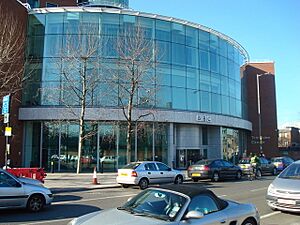
BBC Studios is a commercial part of the BBC. It makes money by selling BBC programs and other products. It also runs several TV stations around the world. It was formed in 2018 by combining the BBC's production and international sales teams.
BBC Studios owns and runs several commercial channels globally. These include BBC UKTV in Australia and New Zealand. It also has children's channels like CBeebies and BBC Kids. Other channels include BBC Earth (for nature shows) and BBC Lifestyle (for food, style, and wellbeing programs).
BBC Studios also distributes the 24-hour international news channel BBC News. This channel is separate from BBC Studios to keep its news neutral. It has 50 foreign news offices and reporters in many countries. It reaches over 294 million households worldwide.
BBC Studios also owns the UKTV network of seven channels. These channels show old BBC programs. Examples include Alibi (crime dramas) and Dave (comedy).
Many BBC programs are sold to TV stations in other countries. Comedy, documentaries, crime dramas like Luther and Peaky Blinders, and historical dramas are very popular. The BBC's reality show Strictly Come Dancing has been sold to 60 other countries as Dancing with the Stars.
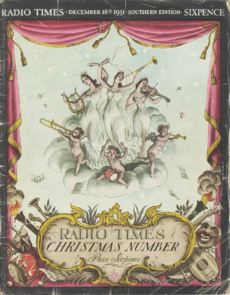
BBC Studios also produces books and magazines that go with programs. The Radio Times magazine was first published by the BBC in 1923. It lists all British TV and radio shows. Other magazines include BBC Top Gear and BBC Good Food. BBC Studios also publishes books under the BBC Books brand. It sells soundtrack albums, singles, and DVDs.
Cultural Importance
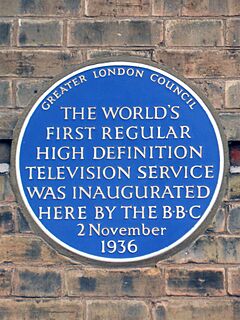
Before TV became popular, radio was very important in the UK. The BBC's radio programs reached every home. This was especially important during the Second World War. The BBC launched the world's first "high-definition" TV service in 1936. It was the only TV broadcaster in the UK until 1955.
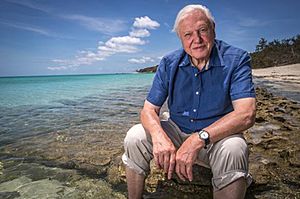
Even with competition from other channels, the BBC remains a big part of British culture. It makes TV and radio programs for everyone. BBC2 allowed the BBC to make programs for special interests. Famous BBC shows include Doctor Who, Monty Python's Flying Circus, and Fawlty Towers. Fawlty Towers was named the best British TV show ever in 2000.
Top of the Pops, the world's longest-running weekly music show, started in 1964. Match of the Day, a football show, has been on air since 1964. Some BBC shows have even changed society. For example, The Great British Bake Off made baking very popular in the UK.
The BBC's programs are watched all over the world through services like the BBC World Service and BBC News. Long-running BBC shows include:
- Desert Island Discs: Radio show since 1942.
- Sports Report: Radio show since 1948, the world's longest-running sports radio program.
- The Archers: Radio drama since 1951, the world's longest-running drama.
- Panorama: TV news program since 1953, the world's longest-running news TV program.
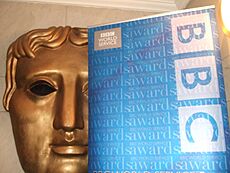
The BBC has broadcast the British Academy Film Awards (BAFTAs) since 1956. It has shown the British Academy Television Awards exclusively since 2007.
The term "BBC English" used to mean a very clear way of speaking English. But now, the BBC uses more regional accents to show the diversity of the UK. The BBC tries to include everyone, as all people pay the licence fee.
Nicknames for the BBC
Older UK audiences often call the BBC "the Beeb." This nickname was made popular by radio DJ Kenny Everett. For example, David Bowie's BBC recordings were released as Bowie at the Beeb. Another nickname, less used now, is "Auntie." This might come from the idea that "Auntie knows best," or from the "aunties" and "uncles" who hosted children's shows early on. The two nicknames are sometimes used together as "Auntie Beeb."
BBC Logos and Symbols
Logos
Coat of Arms
More About the BBC
- Gaelic broadcasting in Scotland
- List of BBC television channels and radio stations
- List of television programmes broadcast by the BBC
- Public service broadcasting in the United Kingdom
- Television in the United Kingdom
See also
 In Spanish: BBC para niños
In Spanish: BBC para niños
 | Aaron Henry |
 | T. R. M. Howard |
 | Jesse Jackson |


